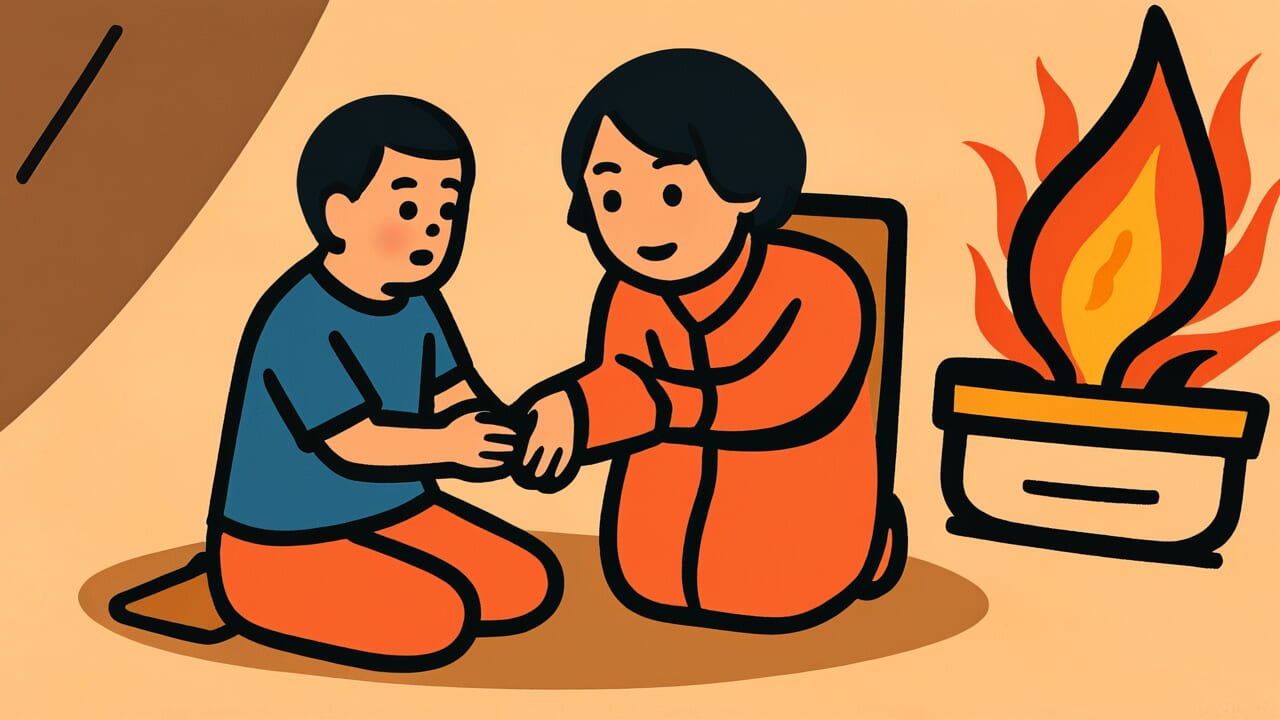How to Read “Adults are children of fire”
おとなはひのこ
Meaning of “Adults are children of fire”
“Adults are children of fire” is a warning that relationships with people in positions of power require the same caution you’d use when handling fire sparks. Fire sparks are beautiful and attractive, but if you approach carelessly, you’ll get burned.
Similarly, dealing with powerful people offers potential benefits, but one wrong word or inappropriate action can bring great disaster.
This proverb applies to relationships with bosses, superiors, and influential people. It teaches the importance of always being aware of their mood and position while maintaining appropriate distance.
Even in modern society, this wisdom applies to situations with power imbalances, like workplace hierarchies or client relationships. The proverb contains wisdom about human relationships: respect others while never forgetting the caution needed to protect yourself.
Origin and Etymology
No clear written records explain the origin of this proverb, but we can make interesting observations from how the words are structured.
The word “otona” (adult) here likely refers to people of high status or position. Before the Edo period, Japan had a custom of calling people of high social standing like samurai or nobles “otona.”
Meanwhile, “hi no ko” (children of fire) means sparks that fly from fire.
Fire sparks look beautiful and attractive, but get too close and they’ll scorch your clothes or burn your skin. This dangerous quality became a metaphor for relationships with powerful people.
Dealing with people of high status offers potential benefits, but one misstep carries the risk of bringing great disaster.
In feudal society especially, displeasing a powerful person could lead to ruin not just for yourself but for your entire family or clan.
People therefore needed to constantly be aware of their distance from powerful people and behave cautiously. Against this social background, the expression using fire sparks as a familiar danger emerged to warn about caution in relationships with the powerful.
Usage Examples
- The new department head has a good reputation, but adults are children of fire, so you should approach cautiously at first
- This is a chance to get close to that company’s president, but adults are children of fire, so let’s avoid careless remarks
Universal Wisdom
The proverb “Adults are children of fire” reveals the essential danger of power in human society. Why are people attracted to the powerful while simultaneously fearing them? The answer lies in power’s dual nature.
Powerful people have the ability to distribute resources and opportunities. The desire to receive these benefits is a natural human emotion.
But at the same time, powerful people also have the ability to control others’ fates. A moment of displeasure can instantly collapse what you’ve built over many years.
This tension has remained constant throughout human history. Whether in ancient dynasties or modern organizations, caution is always required around power.
This is because powerful people are also human, subject to emotions and moods. No human exists who can make completely fair and rational judgments.
This proverb has been passed down through generations because it represents wisdom people learned through experience. Our ancestors witnessed countless failures of people who misjudged their distance from power.
Seeing people reach for beautiful, glowing fire sparks and get burned, they left warnings for future generations. This is an eternal truth about human relationships.
When AI Hears This
A burning fire is actually a rare “low entropy state” in the universe. In other words, it’s an orderly state where energy is concentrated in one place.
When this fire becomes fire sparks over time and scatters, that’s evidence of the second law of thermodynamics at work. This law teaches that “energy always moves from concentrated states to dispersed states.”
What’s interesting is that this change is completely one-way. The probability of scattered fire sparks naturally gathering back into a blazing fire is essentially zero.
It’s like water spilled from a cup never naturally returning to the cup. When physicists calculate it, that probability becomes astronomically low, like one in ten to the power of dozens.
Human passion and anger follow the same principle. Intense emotions are high entropy-generating states that consume massive amounts of energy in the brain.
Maintaining this state requires enormous energy and is biologically unsustainable. That’s why emotions inevitably cool over time. This isn’t a matter of willpower but an inevitability governed by the physical laws of the universe.
This proverb appears to describe human psychology, but it actually brilliantly captures the fundamental principles of matter and energy. Order always moves toward disorder. This is the iron law of the universe.
Lessons for Today
What this proverb teaches modern you is the importance of “healthy distance” in human relationships. In relationships with bosses, clients, or influential people, are you pushing yourself too hard trying to win their favor?
What matters is respecting others while not losing yourself. In relationships with powerful people, there’s a temptation to bend your values and judgment because you expect benefits.
But what you lose there might be greater than money or status.
In modern society, the same applies to relationships with influencers on social media. Connections with people who have many followers or are well-known in their industry are attractive.
But if you become too dependent on them, you’ll lose your authentic self.
This proverb isn’t telling you to be timid. Rather, it teaches the wisdom of building relationships smartly while protecting yourself.
By maintaining appropriate distance, you can sustain good relationships for a long time. Enjoying the beauty of fire sparks while knowing the distance that prevents burns—that’s how to build mature human relationships.



Comments